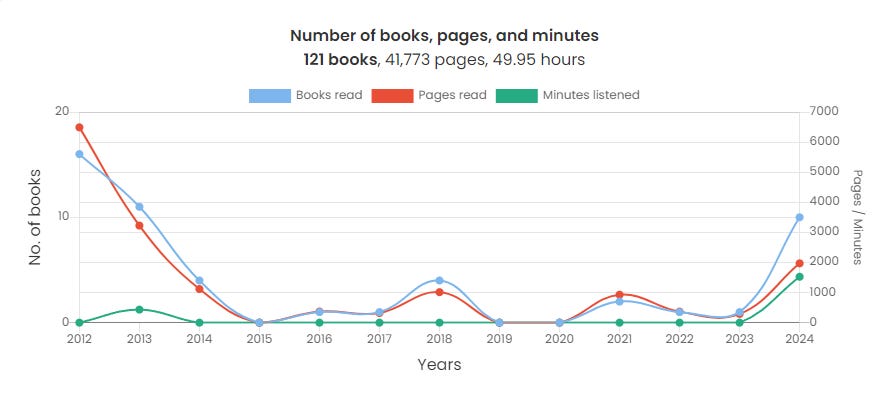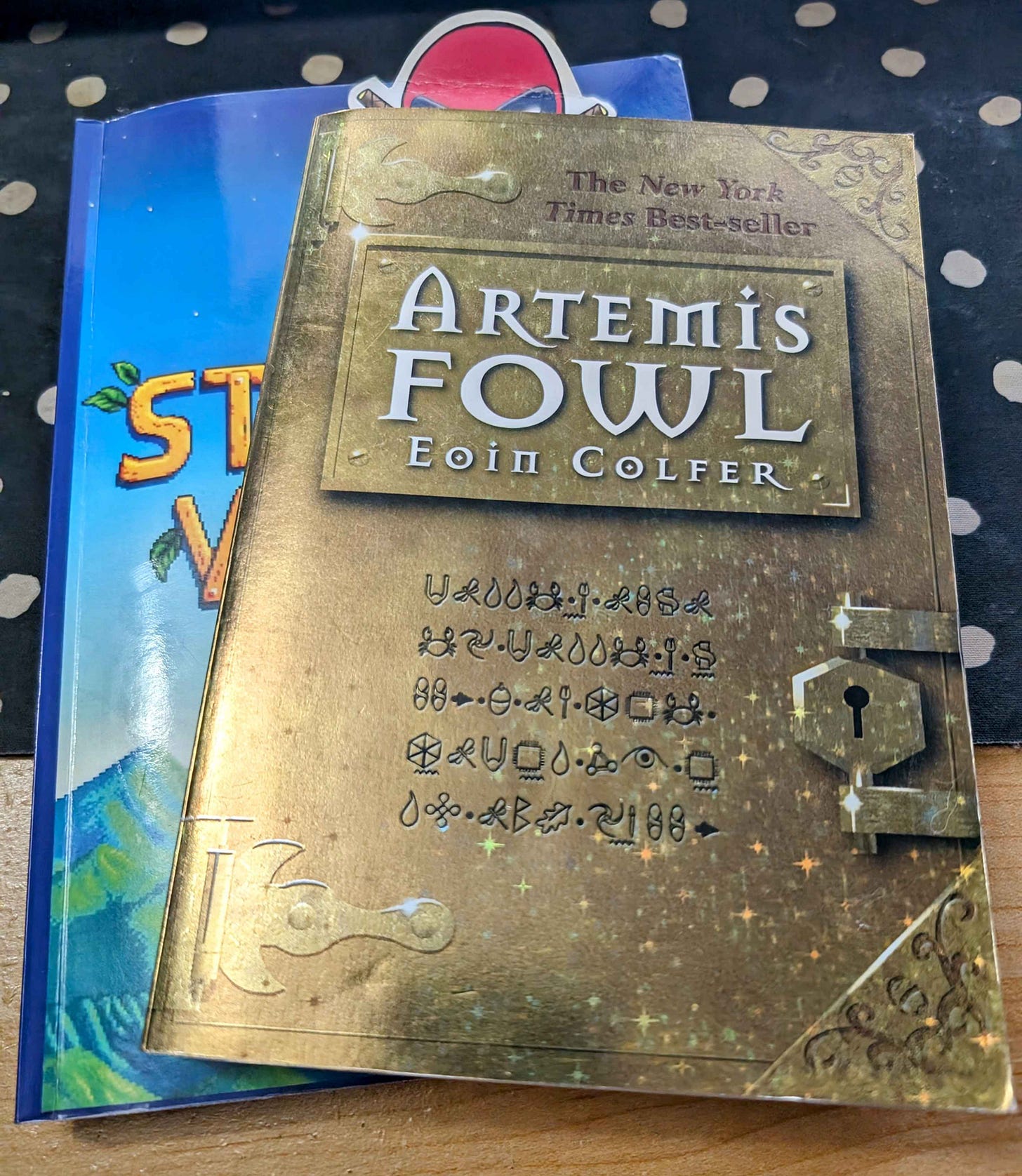In a successful bid to do more reading in 2024, one of the final books of the year that I picked up to read was the first Artemis Fowl novel. It seemed like a solid book to end the year with, as a middle grade novel that is a fast paced fantasy story.
I finished it today (December 30), bringing my total number of books read in 2024 up to 10! Which doesn’t seem like a lot but… here’s my reading history for the past 12 years:
2012 was a good year for reading, and even then I “only” read 16. 2025 is going to be even more ambitious, but that’s for another post. On to my thoughts about Artemis Fowl Book #1:
After the first three chapters, you get a very solid idea of the general gist of the story. Boy-genius 12-year-old Artemis Fowl, ungodly rich from his family’s illegal/questionable endeavours, wants to get even more ungodly rich. His family employs bodyguards for each member of the family (his, unironically, named Butler), who are with them from infancy through maturity. He’s learned of the fair folk (generally all supernatural creatures are grouped into the category of “fairies” in this world), and extorts ‘The Book’ from a down-on-her-luck fairy who has lost most of her powers. Through the course of his natural overwhelming intelligence, he finds a way to decipher the fairy’s book. Which, apparently, every single fairy in the world has the same book.
The perspective shifts between Artemis himself and one of the fairy characters (Short or Root being the main two in the first half of the story). You learn little bits about the world and the separation between humans (“mud people” as the fairies call them) and fairies, and though there is some incredibly apt (even to this day) descriptions and allegories of humanity as a toxic scourge on the planet… it also does rely very heavily on the idea that every subset fairy race is firmly entrenched into their personality, behaviour, etc. There is very little nuance in personality outside of the main characters that you see.
Though the writing is simple and engaging, on deeper analysis the contents do rely heavily on shortcuts, assumptions, and stereotypes. Which isn’t inherently bad, naturally, just an observation.
The way that dwarves are depicted and described in this world is… unique. I don’t particularly want to go any further into it, but it was quite different from typical fantasy lore. The dwarf character was spunky, I wouldn’t mind hearing more about his exploits.
Ultimately, rounding out the novel was a glorious battle between Butler and a troll, our main elf character regaining her powers, and the persistent struggle for power regardless of the effect it has on the collective.
I gave the book an overall 3.25 stars on Story Graph. For me, 3 and up means “it was worth reading, and I don’t regret reading it”, and the 0.25 was because of how easy of a read it was without being boring or void of any depth. It was an enjoyable read, and I will be reading the others in the series if for no other reason than to figure out if Artemis gets more complex or the story gets more nuanced.
On the character development front, there is some growth that seems to appear in the later 2 chapters between Artemis, Butler, and even Root. The story is definitely more focused on the plot and the story rather than on the development of the characters, at least in this volume. I am interested to see if that trend continues with the others in the series, or if that is simply the focus for this one as an emphasis on world building and the establishment of in-world rules, laws, norms, etc.
Overall, if you’re looking for a book that is easy to read, easy to follow, and enjoyable on the way through - Artemis Fowl isn’t a bad choice. It’s not blow-your-socks-off amazing, but it’s consistent and written very clearly without too much pomp or circumstance.
If you were to encourage your teenage child to read it (which is probably the intended audience, given that it is a middle grade novel with a 12-year-old main character), I would encourage you to read it as well and have conversations on the ways in which this story is very much a fantasy tale unrealistic, as well as the ways that the story does (to whatever degree) accurately describe the real world. This may seem like a no-brainer, however as an avid-reader when I was a child with absolutely zero oversight or discussion with family on it beyond “have you read the newest Goosebumps novel?”, having open dialogue and discussing the ways in which a story is reflective of reality as well as the ways that it is not can and will encourage deeper and more critical thinking.
The ability to read and analyze things deeply is unfortunately becoming less commonplace, at least in the general public. Each person can contribute to that, and I strongly encourage you to do so! Starting with easy reads and quick fantastical stories is a way to get a fun story in as well as easy to analyze scenes and characters.
Have you read any of the Artemis Fowl novels? What did you think? Did you read them as a child and have fond memories of them, or have you read them recently? Let me know! I’d love to have a conversation.







